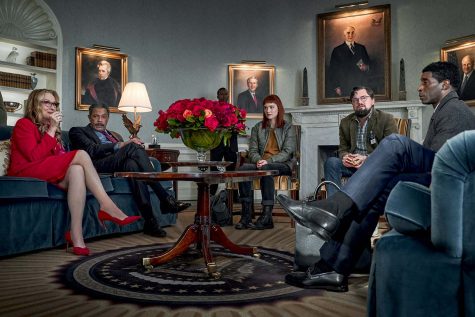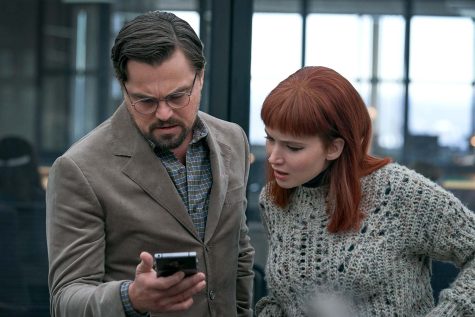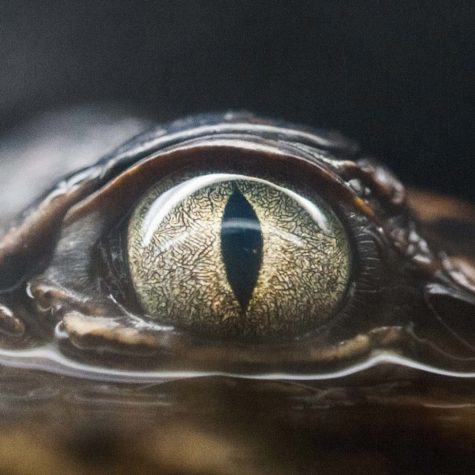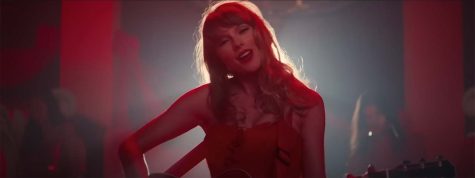“Don’t Look Up” presents a story we may not want but one we might deserve
“Don’t Look Up” is a satirical film acting as an allegory for response to climate change, 2021. Courtesy of Netflix.
“Don’t Look Up” is the most recent film from writer/director Adam McKay, boasting a star-studded cast, a premise ripe for social commentary, and a tendency to throw subtlety out the window for overly cynical undertones. While some bizarre editing choices still persist in this installment to McKay’s directorial career, “Don’t Look Up” commits to a premise well worth the watch and organizes an otherwise erratic film. Two astronomers, played by Leonardo DiCaprio and Jennifer Lawrence, discover a ten-kilometer comet heading straight towards earth, an asteroid with the potential to wipe out everyone on the planet. While Hollywood tropes may dictate the final act consist of DiCaprio flying a jet into the asteroid in a dramatic show of self-sacrifice, while all our cast members watch in somber yet grateful countenance, “Don’t Look Up” isn’t ashamed to take its satire and cynicism to new heights, quickly directing its criticism, not towards apathy for climate change, but our media apparatus as a whole: a tool used to accentuate both conspiracy theories and shallow sensationalism.
Having a message is all well and good, but promoting a message without crafting a good movie makes for pretty ineffective cinema, and a lot of talent came together to create this film. Saying the acting is top-notch is an understatement, probably because almost every frame has an Oscar nominee on screen. Because of this, no performance feels out of place but the cast does seem unnecessarily star-studded. With such skilled actors, the film’s bizarre and ineffective presentation style sticks out. This style is nothing new for Adam McKay, who frequently employs comedy that revolves around overexplaining plot elements to the audience. While this style worked well for explaining highfalutin banking strategies in “The Big Short” or exploring legal loopholes in “Vice,” the editing style here doesn’t work much at all, since most of what’s explained isn’t that complicated. Adam McKay seems very scared to leave much of anything to subtlety or interpretation, and this hesitancy really sticks out in a fiction piece and satire. Letting audiences misunderstand things is preferable to sounding pedantic.

With such a great premise and actors, the story concludes in a pretty wobbly fashion. The ending, while not resorting to the optimism and ideal heroes of “Armageddon”, presents an aftermath to a crisis that is both depressing and equally critical of our media environment. While being a scathing critique of profit motive news and profit run politics, “Don’t Look Up” provides no saving grace for our protagonists. “Don’t Look Up” believes we are destined to suffocate ourselves with stupidity, and there’s nothing we can really do about it. At first, this kind of conclusion seems pretty pessimistic. However, after a couple of years of anti-vaxxers and January 6th, apathy or doubt over a comet hitting the planet isn’t the most unrealistic storyline. Americans have reached such great heights of conspiracy-minded and anti-science thinking that something as threatening as a comet killing the Earth’s entire population would most likely be treated in a cavalier way.
So, do we deserve a story that lacks so much hope and optimism for the future of humanity? I can’t really answer that. What I can say is that “Don’t Look Up” is thankfully not another one of those “you should care about climate change” movies. We’ve entered a new era where artists have moved on from “oh, if people could just see the scientific data” pipe dreams. Yes, anyone who understands how carbon dioxide works will know climate change is an existential threat, but if you don’t understand that by now, you most likely never will. “Don’t Look Up” is more interested in exploring how sensationalist media infrastructure and modern political discourse isn’t built for mankind-threatening crises. “Don’t Look Up” presents the possible (and growingly more likely) possibility that we never address our problems in time, and I think it does a good job of leaving the audience with the question “so, how do I prevent this from happening?” Your answers to that question will vary, and I’m not going to act like anyone really has an objective answer. Still, it’s a question worth contemplating, and “Don’t Look Up”, despite some editing hiccups and lack of subtlety, prompts this question in a worthwhile fashion. The movie is funny, sad, satirical, and necessarily pessimistic. I’m giving this one a 4 out of 5.


Hey everyone! My name is Joseph Nelson, and I am an English major graduating in 2022. I joined The Wichitan in the Fall of 2020, and I've really enjoyed...













